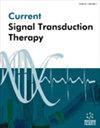Exploration of Potential Cyclin-dependent Kinases and their Inhibitors to Combat Abnormal Signalling and Cancer
Q3 Medicine
引用次数: 0
Abstract
Regulation of cell proliferation depends on stimulatory and inhibitory factors that act in a coordinated manner in response to external signals. Various agents, including mitogens, growth factors, cytokines, and other external factors, can impact the mitotic cell cycle, resulting in either provoking growth, differentiation, or apoptosis. Many kinases, such as protein kinases, regulate mitotic cell proliferation through normal signalling. One of the major protein kinase family members is cyclin-dependent kinases (CDK), which are responsible for the regulation of cell cycle progression. If the cell cycle-regulatory mechanisms are permanently altered, it can cause abnormal proliferation that leads to neoplasia. This can result in tumour development, where the availability and expression of CDKs become altered, contributing significantly to impaired cell proliferation. Changes like these are often a characteristic of cancer. CDK inhibitors have shown significant clinical benefits in treating various types of tumours in recent years. The output has been achieved by the clinical approvals of particular CDK inhibitors. Researchers have also been studying the proteolysis-targeting chimera (PROTAC) molecule for the last two decades. This molecule uses ubiquitin-mediated proteasome mechanisms to break down specific targets, making it a promising method for targeted protein degradation (TPD). TPD has become a promising therapeutic option for tackling disease-causing proteins that are otherwise challenging to treat using traditional small molecules. This review provides an overview of the state of knowledge and a general understanding of selective or nonselective CDK inhibitors and PROTAC degraders currently under development or clinically approved congeners, focusing on improving cancer therapy.探索潜在的细胞周期蛋白依赖性激酶及其抑制剂,对抗异常信号和癌症
细胞增殖的调控取决于刺激因子和抑制因子,它们以协调的方式对外部信号做出反应。各种因子,包括有丝分裂原、生长因子、细胞因子和其他外部因子,都会影响有丝分裂细胞周期,导致细胞生长、分化或凋亡。许多激酶(如蛋白激酶)通过正常信号调节有丝分裂细胞的增殖。依赖细胞周期蛋白的激酶(CDK)是蛋白激酶家族的主要成员之一,负责调节细胞周期的进展。如果细胞周期调控机制发生永久性改变,就会引起异常增殖,导致肿瘤。这可能导致肿瘤发生,CDK 的可用性和表达发生改变,从而极大地损害细胞增殖。这些变化通常是癌症的特征之一。近年来,CDK 抑制剂在治疗各类肿瘤方面显示出显著的临床疗效。特定 CDK 抑制剂获得临床批准,从而取得了上述成果。过去二十年来,研究人员还一直在研究蛋白水解靶向嵌合体(PROTAC)分子。这种分子利用泛素介导的蛋白酶体机制来分解特定靶标,是一种很有前景的靶向蛋白质降解(TPD)方法。TPD 已成为一种很有前景的治疗方法,可用于解决传统小分子药物难以治疗的致病蛋白质。本综述概述了目前正在开发或已获临床批准的选择性或非选择性 CDK 抑制剂和 PROTAC 降解剂同系物的知识状况和一般理解,重点是改善癌症治疗。
本文章由计算机程序翻译,如有差异,请以英文原文为准。
求助全文
约1分钟内获得全文
求助全文
来源期刊
CiteScore
1.70
自引率
0.00%
发文量
18
审稿时长
>12 weeks
期刊介绍:
In recent years a breakthrough has occurred in our understanding of the molecular pathomechanisms of human diseases whereby most of our diseases are related to intra and intercellular communication disorders. The concept of signal transduction therapy has got into the front line of modern drug research, and a multidisciplinary approach is being used to identify and treat signaling disorders.
The journal publishes timely in-depth reviews, research article and drug clinical trial studies in the field of signal transduction therapy. Thematic issues are also published to cover selected areas of signal transduction therapy. Coverage of the field includes genomics, proteomics, medicinal chemistry and the relevant diseases involved in signaling e.g. cancer, neurodegenerative and inflammatory diseases. Current Signal Transduction Therapy is an essential journal for all involved in drug design and discovery.

 求助内容:
求助内容: 应助结果提醒方式:
应助结果提醒方式:


